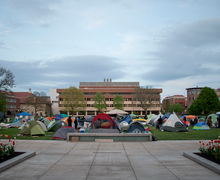Weather-proof: Syracuse ranks as No. 1 safest city from natural disasters
Andy Casadonte | Art Director
In spite of its reputation for heavy snowfall, Syracuse ranks as the top housing market for safety from natural disasters.
“Generally, I think Syracuse is a pretty safe place,” said Mark Monmonier, a distinguished professor of geography in the Maxwell School of Citizenship and Public Affairs. Monmonier has researched the topic through his book, “Cartographies of Danger: Mapping Hazards in America.”
Monmonier’s sentiments reflect the rankings that real estate service website Trulia released Aug. 15. Although no area is completely risk-free from natural disasters, according to the site, 10 large metro areas were recognized for their relatively low risk for five major natural disasters: wildfires, hurricanes, tornadoes, earthquakes and floods.
Syracuse topped the list, with nearby Buffalo, N.Y., three cities in Ohio and others following in the rankings.
Monmonier said Syracuse’s status on the list is largely the result of its fortunate location.
“We’re far enough away from the Atlantic that we’re not going to have problems with storm surge,” he said, addressing the risk of a hurricane. And without a major body of water running through the city, Syracuse tends not to flood.
In terms of earthquakes, the city’s distance from a major fault line prevents major quakes from occurring, said Robert Moucha, assistant professor of earth sciences.
But this doesn’t mean an earthquake couldn’t happen in Syracuse, Moucha said, noting that a 2.7-magnitude earthquake just shook the Adirondacks on Sunday.
“There are faults everywhere,” he said. “And unfortunately, most of the faults on this side of the U.S., we only know of them once they activate.”
Maps, such as the one generated by Trulia, typically look at geographic factors like plate boundaries and known fault lines, in addition to historical record, he said. For Central New York, no real history of earthquakes exists, he added.
Monmonier also said a top ranking doesn’t guarantee safety in Syracuse from earthquakes or other natural disasters.
“It really is an issue of probabilities,” he said.
For example, while tornadoes are not common in the area, he said, they could – and have – touched down in Central New York.
Should a natural disaster occur, Kevin Wisely, commissioner of the Onondaga County Department of Emergency Management, said the city is prepared. A comprehensive emergency management plan, which is reviewed annually and is currently undergoing updates, details various city organizations’ responsibilities for prevention, response and recovery in the case of a natural disaster.
The plan, which Wisely said could apply to any kind of natural disaster, was last used at its most basic level during preparations for Superstorm Sandy last fall. Given Sandy and other hurricanes’ relatively minimal effect, in addition to two recently mild winters, a full-scale implementation of the plan hasn’t been necessary in years, he said.
Although not needing the plan is a good thing, he said, “that also lends itself to a community that could become complacent.
Wisely said his department is currently forming a community resilience strategy to address this, as well as supplement the current emergency management plan with individuals’ roles and responsibilities in case of a disaster.
“The essence is to build a more resilient community so that our citizens, as well as our citizen groups, become better prepared to manage themselves and their communities during times of need,” he said.
Efforts toward the community resilience strategy began last spring and will continue throughout the first half of 2014, he said.
Said Wisely: “We do want to make sure our community stays vigilant.”
Published on August 28, 2013 at 1:47 am




